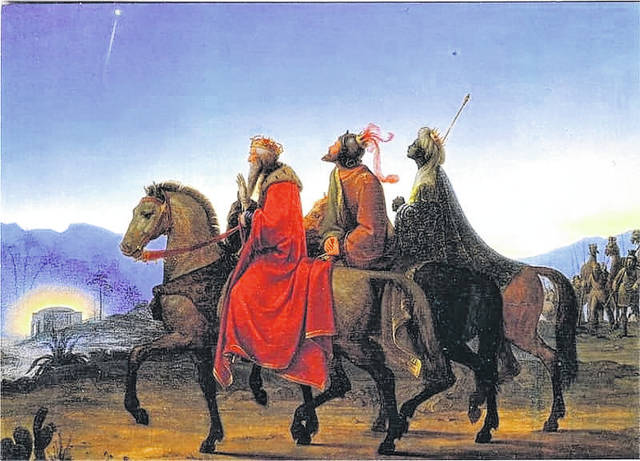
Because the Christmas season ends in many parts of the world on January 6, Twelfth Night became a time of raucous celebration, associated with masking, mumming, drinking and social inversion. This misrule may have been a carry-over to some extent from the riotousness of the pagan Kalends. In Byzantium for example church councils had to legislate against the dancing and transvestism that went on in early January. During the reign of Michael III (842-67) the emperor and his court went so far as to use the occasion to mock the Patriarch of Constantinople and the Mass itself. Mock coronations and consecrations become common in medieval Europe with clerical hijinks, cross-dressing, noise and laughter the order of the day on Twelfth Night.
To commemorate the visit of the Magi who brought gold, frankincense and myrrh to the infant Jesus, Epiphany became the day for giving gifts, especially to children. In the Spanish-speaking world the eve of the day of Los Tres Rejes Magos is when the three wise men pass through on their way to Bethlehem and leave presents for kids who, in turn, leave out snacks for the kings and their camels. In Spain their Majesties and their attendants can be seen processing through the city streets on January 5 in great splendour. In Italy the night of January 5 sees the visit of the Befana (the name itself is a corrption of Epiphania), an old lady who refused to spare time from her housekeeping to accompnay the Three Kings on their journey. She soon repented of her decision and tried to join the Magi but has never succeeded to this day. She therefore visits each home in search of the Christ Child and leaves presents for the little ones that she finds sleeping there.
The custom of the King’s Cake, Twelfth Night Cake, Dreikonigskuchen, gâteau des rois, etc., can be traced back to the thirteenth century. A bean or a pea or a coin was baked into the cake and the lucky finder was named king or queen of the party and could direct others to do his bidding for the evening. Though the tradition lingers in much of Europe (as well as French America) the custom in England was displaced to December 25 where it became the Christmas cake. In medieval France it was customary to put a piece of the cake aside for the poor or to collect money from the rich for their share of the cake and use the money for a charity.
When I was growing up, we called Jan 6th “Little Christmas” and would get a few small gifts in the stockings we had left up. It was a way to say goodbye to the holiday; which is always very hard for me to do!
According to “The World Encyclopedia of Christmas” (a source I’ve always found reliable), Czechs, Estonians, Irish, and Scandinavians use the term “Little Christmas” — but not always to refer to Epiphany.